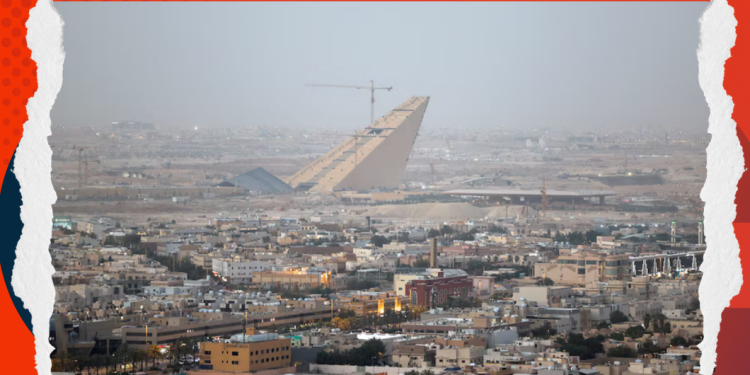Saudi Arabia has ended the era of sky-high pay packages for foreign workers. Companies now offer modest salary increases instead of the 40% premiums that once doubled expatriate incomes.
This reflects a major change in Saudi Arabia’s economic strategy. The kingdom’s $925 billion Public Investment Fund is moving money away from massive construction projects toward artificial intelligence, logistics, and mining operations.
Budget Cuts Hit Megaproject Hiring
Recruiters report a dramatic change in hiring patterns across Saudi Arabia. Project managers who previously earned $100,000 in the kingdom for jobs that paid $60,000 in Dubai now see far smaller pay gaps.
“On one hand, you have the region’s biggest economy rationalizing and on the other side, you have a huge supply of candidates who are very open to coming to the region,” said Magdy Al Zein, managing director at recruiter Boyden. “So what you get is employers rethinking packages.”
The kingdom’s flagship projects face significant delays. NEOM, the $500 billion futuristic desert city, and Trojena, set to host the 2029 Asian Winter Games, now operate under tight budget constraints.
PIF Strategy Shift Drives Changes
The Public Investment Fund’s new focus explains the hiring slowdown. The sovereign wealth fund is steering investments away from real estate megaprojects that dominated the early years of Vision 2030.
Instead, the fund now prioritizes sectors with faster returns:
- Artificial intelligence and data centers
- Logistics and supply chain operations
- Mining and rare earth minerals
- Religious tourism expansion
This strategic pivot comes as the PIF faces pressure to generate better short-term returns. The fund’s annual average return dropped to 7.2% between 2017 and 2024, down from 8.7% at the end of 2023.
Oil Price Pressures Add to Spending Cuts
Lower oil prices compound Saudi Arabia’s budget challenges. The kingdom needs crude prices near $100 per barrel to balance its budget, according to International Monetary Fund estimates. Recent price declines have widened the fiscal deficit despite production cuts aimed at supporting global oil markets.
These financial pressures compel government-linked companies to reconsider costly foreign hiring practices. Many firms now direct their limited recruiting budgets toward “hot jobs” in AI and digital sectors rather than traditional roles in construction and manufacturing.
Competition Increases for Available Positions
Saudi Arabia’s labour market transformation has created more competition for foreign workers. The kingdom achieved record-low unemployment among Saudi citizens at 6.3% in the first quarter of 2025. Private sector employment for Saudis grew 31% between 2016 and the second quarter of this year.
This domestic job growth reduces reliance on foreign expertise in many sectors. Companies can now choose from larger pools of qualified candidates, both Saudi and international, giving employers more negotiating power over salaries.
Salary Gaps with the UAE Narrow Significantly
The pay difference between Saudi Arabia and the United Arab Emirates has shrunk dramatically. Recruiters report only 5% to 8% salary premiums for Saudi positions compared to UAE roles, down from much larger gaps in previous years.
“Convincing people to move from the UAE is a challenge; they expect a high premium,” Al Zein noted. The UAE’s established infrastructure, international schools, and healthcare systems continue attracting talent despite smaller pay differences.
Dubai-based recruiter Trefor Murphy of Cooper Fitch confirmed the convergence: “There is little difference now between average salaries in Saudi Arabia and the UAE.”
Tech Sectors Still Command Premium Pay
Despite overall budget tightening, Saudi companies continue paying competitive rates for artificial intelligence and technology roles. The kingdom’s push into AI development, led by PIF-owned company Humain, creates demand for specialized digital talent.
Humain plans to build 6 gigawatts of data center capacity as part of Saudi Arabia’s AI infrastructure expansion. CEO Tareq Amin told reporters that funding flows freely for priority projects: “Everything we ask for, we get.”
Foreign Workers Still See Opportunities
While premium pay packages have decreased, Saudi Arabia remains attractive for workers from regions with slower economic growth. The kingdom’s 4.4% projected growth rate this year outpaces many global markets.
Louise Knutsson, CEO of Dubai-based Matches Talent, sees the changes as market maturation rather than contraction. “Packages are now far more measured, anchored to data, performance, and real market benchmarks,” she said. “For some, that feels like contraction. For me, it signals maturity.”
This affects primarily expatriates moving between Gulf countries. Workers from outside the region still find Saudi opportunities attractive compared to the conditions in their home market.
Vision 2030 Enters New Phase
Saudi Arabia’s economic transformation plan has reached a turning point. The kingdom achieved its Vision 2030 unemployment target six years ahead of schedule, freeing resources for other priorities.
The government now focuses on building sustainable industries rather than showcase projects. The expansion of religious tourism around Mecca and Medina offers more immediate returns than futuristic city construction.
This pragmatic approach reflects lessons learned from the early implementation of Vision 2030. Many megaprojects struggled with execution challenges and cost overruns while generating limited near-term economic benefits.
The salary adjustment represents a broader normalization of Saudi Arabia’s job market as the kingdom matures beyond oil-dependent development models.














